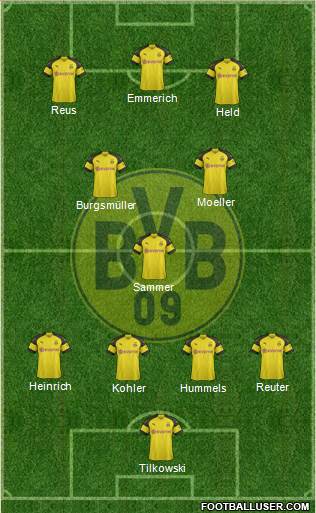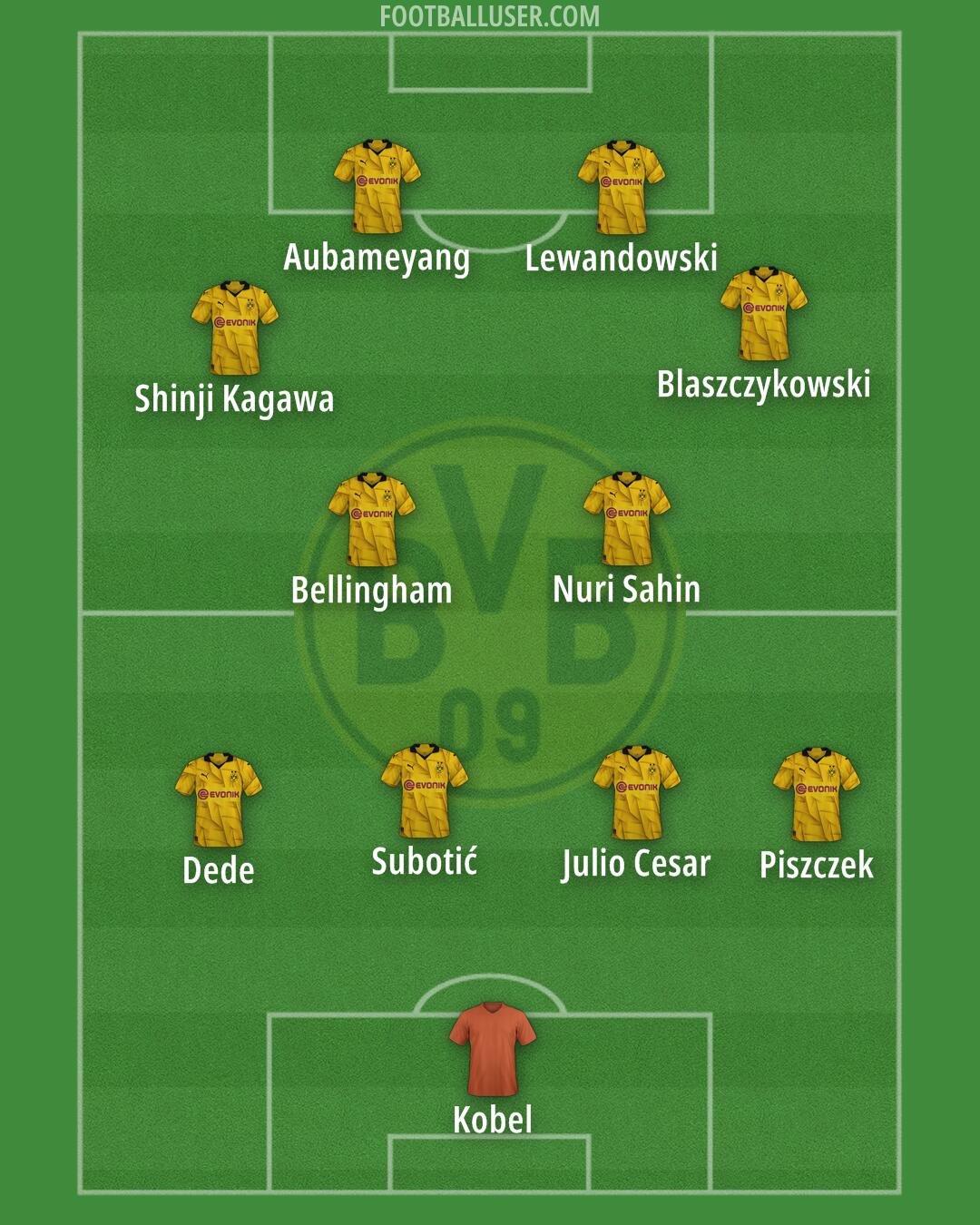 |
| Hummels and Reus |
Borussia Dortmund All-Time Team
Borussia Dortmund All-Time Foreigner Player Team
This is my selection of a 25 member all-time team for the domestic players for Borussia Dortmund. The number 25 was chosen because it is the official squad size for the Champions' League.
Borussia Dortmund was founded in 1909 by eighteen football players from Dortmund. Borussia Dortmund have won eight German championships, three DFB-Pokals, five DFL-Supercups, one UEFA Champions League, one UEFA Cup Winners' Cup, and one Intercontinental Cup. Their Cup Winners' Cup win in 1966 made them the first German club to win a European title.
 |
| Kohler and Sammer |
GK: Hans Tilkowski
Hans Tilkowski played mainly for Westfalia Herne and Borussia Dortmund in the 1950's and 1960's. With Borussia Dortmund, he won the Cup Winners' Cup in 1966. He later played for Frankfrut for three seasons. For West Germany, he was a member of the World Cup teams of 1962 and 1966. In 1966, Tilkowski was the No. 1 goalkeeper of the West German team which lost the World Cup Final against England. He was the German Player of the Year in 1965.
 |
| Hans Tilkowski |
Roman Weidenfeller moved to Borussia Dortmund in 2002 on a free transfer as a replacement for Jens Lehmann. He won 2 Bundesliga title. He received his first cap when he started against England at the Wembley Stadium on 19 November 2013, making him the oldest ever German goalkeeper débutant. He won the 2014 World Cup in Brazil as the backup keeper.
RB: Stefan Reuter
Stefan Reuter played 69 times for Germany between 1987 and 1998. He was Germany's Golden Generation in the 1990's that won the World Cup in 1990 and the European Championship in 1996. At the club level, he played with FC Nürnberg, Bayern Munich, Juventus and Borussia Dortmund. His longest spell was with Borussia Dortmund, where he played over 300 matches. He won the Champions' League in 1996 with them.
 |
| Stefan Reuter |
SW/RB: Max Michallek
Nicknamed "the spider", Max Michallek started his career in the Oberliga West un the 1947-1948 season with Borussia Dortmund. He played with them until 1960. With them, he won the Deutsche Fußballmeisterschaft twice, in 1956 and 1957. The 1956 edition was Borussia Dortmund's first ever victory at the tournament. He later coached the club in the 1970's.
CB: Jurgen Kohler
Jurgen Kohler was regarded one of the best defenders in the 1990's. He earned 105 caps for West Germany/Germany between 1986 and 1998. He won the World Cup in 1990 and the European Championship in 1996. For his club career, he played with Koln, Bayern Munich, Juventus and Borussia Dortmund. He won the Champions' League in 1997 with Borussia Dortmund. He was Footballer of the Year in Germany in 1997.
CB: Wolfgang Paul
Wolfgang Paul was the captain of Borussia Dortmund to the European Cup Winners Cup in 1966. He was a one club man with them between 1961 and 1971. Paul got included in Helmut Schön's West German squad for the 1966 FIFA World Cup. Despite this, the defender never played a match for West Germany and had to retire early because of the effects an injury picked up in the late 1960s had to his game.
CB: Christian Worns
Christian Worns started his career with Waldhof Mannheim but played the majority of his career with Bayer Leverkusen (1991-1998) and Borussia Dortmund (1999-2008). He also had a short stint with Paris St Germain(1998-1999). He was capped 66 times between 1992 and 2005. He went to Euro 1992 and 2004, and the 1998 World Cup Finals in France. However, he was bypassed by German manager Jurgen Klinsmann for the 2006 World Cup Finals at home.
 |
| Christian Worns |
CB: Mats Hummels
Mats Hummels came through the Bayern Munich youth system, but only made one appearance with the senior team. He signed with Borussia Dortmund in 2009 after a loan spell. Over there, he established himself among the best centerbacks in the world. In 2016, he made a dramatic return to Bayern Munich. For Germany, he had over 60 caps since 2010. He was a part of the 2014 World Cup winning team, where he was voted into the team of tournament.
LM/LB: Willi Neuberger
Willi Neuberger played from 1966 until 1983 in the Bundesliga for Borussia Dortmund, Werder Bremen, Wuppertaler SV and Eintracht Frankfurt. With Eintracht he won the DFB-Pokal in 1975 and 1981, and UEFA Cup in 1980. With his 520 Bundesliga appearances he was the record player for a long time. Currently, he is eighth on the all time appearance list of the Bundesliga. He was capped twice for West Germany in 1968. He was named Bundesliga Team of the Year twice in the 1970's.
 |
| Willi Neuberger |
DM: Dieter Kurrat
Dieter Kurt spent 9 seasons with Borussia Dortmund. Nicknamed "Hoppy", he became a club legend, winning the German Championship, the DFB Cup, in 1965 and the European Cup Winner's Cup in 1966. He played over 600 matches for the club. In 1974, he served briefly as a player-coach for the club on interim basis before joining SV Holzwickede. He retired in 1976. He played for West Germany at the youth level.
DM/SW: Matthias Sammer
Born under East Germany, he started with Dynamo Dresden. After unification, he played for Stuttgart and Inter Milan. With Borussia Dortmund, he won the Bundesliga and DFL-Supercup in 1995, the Bundesliga, DFL-Supercup, and European Footballer of the Year in 1996, and the UEFA Champions League and Intercontinental Cup in 1997. With Germany as a player, Sammer won the UEFA Euro 1996. Sammer had with 74 total caps, 23 for East Germany and 51 for the unified side.
DM: Sebastian Kehl
Sebastian Kehl started his career with Hanover 96 and then, played for SC Freiburg before joining Borussia Dortmund in January, 2002. He spent 14 seasons with the club and at one point, he served as their captain. He was a part of their Bundesliga title winning team(2001–02, 2010–11, 2011–12). He earned 31 caps for Germany. He was selected for both the 2002 and the 2006 World Cups, appearing once in 2002 and 4 times in the latter.
 |
| Sebastian Kehl |
CM: Michael Zorc
Born in Dortmund, Michael Zorc was a one club player. He played 463 Bundesliga games for Borussia Dortmund (a club record) between 1981 and 1998, also being for many years the team's captain. He also ranked, at one time, the club's second all-time top goalscorer, thanks in part to his excellent penalty-taking ability. He won the Champions' League in 1996. He was capped 7 times between 1992 and 1993.
RW: Stan Libuda
Libuda played for FC Schalke 04 from 1961 until 1976 with two interruptions: from 1965 until 1968 he played for Borussia Dortmund, and 1972–73 for RC Strasbourg. He was a major factor in Borussia Dortmund's 1966 UEFA Cup Winners' Cup championship. He scored the final goal against Liverpool F.C. to earn a 2–1 extra time victory for Dortmund. Capped 26 times, he was a part of the team that finished third in the 1970 FIFA World Cup.
AM/FW: Siegfried Held
During Siegfried Held's career, he played 442 games (72 goals) in the Bundesliga, for Borussia Dortmund, Offenbach and Bayer 05 Uerdingen. He scored a goal at the 1966 Cup Winners' Cup Final, in which Borussia Dortmund won it by beating Bill Shankly's Liverpool. He also made 41 appearances for the West German national team. He was a member of both 1966 and 1970 World Cup Finals. He did not play in the Final of Euro 1972 because he was needed to play for his club at the league promotion round.
 |
| Siegfried Held |
AM: Andreas Moeller
Moeller played for Eintracht Frankfurt, Borussia Dortmund, Juventus (1992–94), and Schalke 04. He won the UEFA Cup with Juventus in 1993, beating Borussia Dortmund 6–1 on aggregate, Moeller scoring one of the goals. He then won the Champions League with Dortmund in 1997, beating his former team, Juventus, 3–1. With the national team, he was capped 85 times, winning the 1990 World Cup and Euro 96. He also played for his country at the 1994 and 1998 World Cups, as well as Euro 92.
AM: Alfred Schmidt
Schmidt played as attacking midfielder for Borussia Dortmund from 1956 to 1968, winning the German Cup in 1965 and the UEFA Cup Winners' Cup in 1966. In total, he played for Dortmund 276 times, scoring 67 times. Capped 25 times between 1957 and 1964 and was a member of the team that finished fourth at the 1958 FIFA World Cup in Sweden.
AM/LW: Marco Reus
In 2009, Reus began his career with Bundesliga club Borussia Mönchengladbach. He became one of Europe's brightest young player. In 2012, he joined Borussia Dortmund, his hometown club. Since 2011, Reus established himself as a regular member of Joachim Löw's national team, but he missed both the 2014 World Cup and 2016 European Championship through injuries. He was a member of the team at the World Cup Finals in 2018.
 |
| Marco Reus |
Rielde appeared in 207 Bundesliga games over the course of eight seasons, scoring 62 of his 72 goals for Werder Bremen and Borussia Dortmund. He won the 1996 Champions' League title in Dortmund. He also played for Lazio in Italy and Liverpool in England. A German international for six years, Riedle represented the country in two World Cups – winning the 1990 edition – and Euro 1992.
ST: Manni Burgsmüller
Burgsmüller played in two different spells for local Rot-Weiss Essen and Bayer Uerdingen alike. In 1976, Burgsmüller left Uerdingen for Borussia Dortmund, where he played until 1983. He played for 1. FC Nürnberg and second level with Rot-Weiß Oberhausen before joining Werder Bremen in 1985 as a veteran player nearly 36 years old. The club won the Bundesliga in 1988. He was capped 3 times in 1977 and 1978.
ST: Alfred Preissler
Preissler is the all-time leading scorer for Borussia Dortmund. He played in the Dortmund team which won back-to-back German championships in 1956 and 1957. Together with Alfred Kelbassa and Alfred Niepieklo, Preißler formed a famous trio that was nickname "The Three Alfredos". He played two matches for the then West Germany national football team in 1951 against Austria and the Republic of Ireland.
ST: Lothar Emmerich
Lothar Emmerich won 5 caps for West Germany all in 1966, helping the national team to reach the Final of the World Cup Finals in 1966. For his club career, he scored 115 goals in only 183 Bundesliga matches. From 1960 to 1969, he played for Borussia Dortmund. With them, he won the European Cup Winners Cup in 1966. He scored 14 goals (a record) during the competition (including 4 goals against defending champions West Ham United in the semi-finals).
 |
| Lothar Emmerich |
Squad Explanation
-- Łukasz Piszczek, Dede, Stephane Chapuisat and Robert Lewandowski are the only foreign players on my Borussia Dortmund All-Time team. So, 21 players from the all-time team made it to this all-time team for German players. So this team is not much different from the all-time team.
 |
| Matthias Sammer |
 |
| Roman Weidenfeller |
 |
| Andreas Mueller |
 |
| Manni Burgsmüller |














